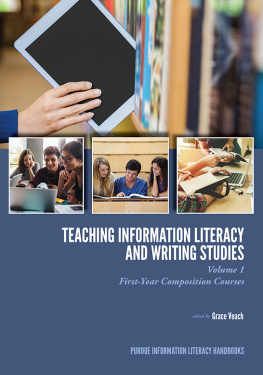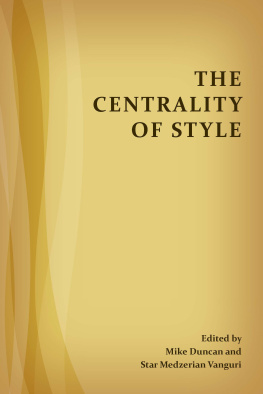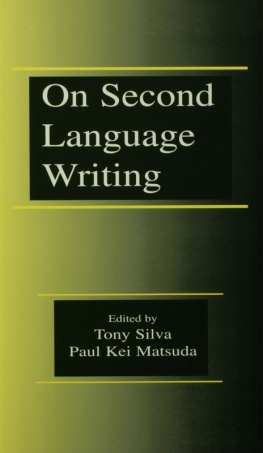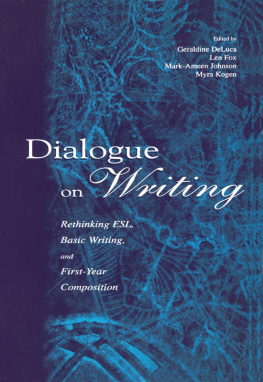

2012 by the University Press of Colorado
Published by Utah State University Press
An imprint of University Press of Colorado
5589 Arapahoe Avenue, Suite 206C
Boulder, Colorado 80303
The University Press of Colorado is a proud member of

| The Association of American University Presses. |
The University Press of Colorado is a cooperative publishing enterprise supported, in part, by Adams State College, Colorado State University, Fort Lewis College, Metropolitan State College of Denver, Regis University, University of Colorado, University of Northern Colorado, Utah State University, and Western State College of Colorado.
All rights reserved
Manufactured in the United States of America
Cover design by Barbara Yale-Read
ISBN: 978-0-87421-882-4 (paper)
ISBN: 978-0-87421-883-1 (e-book)
Library of Congress Cataloging-in-Publication Data
Ritter, Kelly.
Exploring composition studies : sites, issues, and perspectives / Kelly Ritter and Paul Kei Matsuda.
p. cm.
Includes bibliographical references and index.
ISBN 978-0-87421-882-4 (pbk.) -- ISBN 978-0-87421-883-1 (e-book)
1. English language--Rhetoric--Study and teaching. I. Matsuda, Paul Kei. II. Title.
PE1404.R524 2012
808.042071--dc23
2011048144
FOREWORD Defining Composition Studies Again, and Again Andrea A. Lunsford |
Some fifteen years ago, Lynn Bloom, Don Daiker, and Ed White published Composition in the Twenty-first Century: Crisis and Change, a collection of essays from a conference by the same name that had been, according to the editors preface, three years in the making and that had a strong impact on the field. Their volume still makes for instructive reading, perhaps especially with fifteen years hindsight. Hoping to chart a new geography of composition (2), the editors and writers of this volume (including Stephen North, Shirley Brice Heath, David Bartholomae, Linda Flower, James Berlin, Anne Gere, James Slevin, and Peter Elbow) took on a number of then-pressing questions, as indicated by a selection of section titles:
What Is Composition and Why Do We Teach It?
What Have We Learned from the Past and How Can It Shape the Future of Composition?
Who Will Assess Composition in the 21st Century and How Will They Assess It?
What Issues Will Writing Program Administration Confront in the 21st Century?
Who Should Teach Composition and What Should They Know?
What Direction Will Research in Composition Take and How Will Research Affect Teaching?
What Political and Social Issues Will Shape Composition in the Future?
What Will Be the Meaning of Literate Action and Intellectual Property?
In closing the volume, Lynn Bloom notes that conference attendees approached the new century far from complacent about the past, uncomfortable with the present, uneasy about the future. Taken together, she says, the essays in the volume recognized this state of mind and, in addressing the questions above, demonstrated the need for a new map to provide direction through territory that superficially looks like familiar terrain but that is, in some important ways, still terra incognita (273). Bloom signs off with a haunting image of the map of the universe of composition at the emergence of the 21st century as an echo of Eschers engraving of one hand drawing another hand. At first glance, the hands look like mirror images of one another; they are not. Nor is either image finished, though initially it appears to be. The process of conceiving, constructing, changing any field is ongoing, dynamic; it represents a world of hope, a world without end (277).
As the Bloom, Daiker, and White volume demonstrates, composition or writing studies has been working on maps of its territory for a long time, often in ongoing and dynamic ways. In fact, a search of the literature will turn up dozens of attempts to map the field along with its theories, objects of study, methods, and pedagogies, at least from the 1960s through the end of the twentieth century. We have been, and perhaps continue to be, much like that one hand attempting to draw another.
In Exploring Composition Studies: Sites, Issues, and Perspectives, editors Ritter and Matsuda are in intertextual conversation with these earlier mapping expeditions and particularly with Bloom, Daiker, and Whites 1996 volume. Certainly they continue the search for definitionsof the nature of first-year writing (Downs and Wardle), of basic writing (Adler-Kassner and Harrington), and of writing across the curriculum (Malenczyk). And this collection also addresses methodological issues (Chiseri-Strater; LEpplantenier and Mastrangelo; and Hawisher and Selfe) as well as concerns related to support for and assessment of writing and learning (Donahue; Fitzgerald; Estrem and Reid; Gunner; Yancey; Matsuda; Peeples and Hart-Davidson). Yet while this volume explores a number of the same issues and asks some of the same questions as those posed by Bloom, Daiker, and White a decade and a half ago, Ritter and Matsudas volume focuses much more specifically on the role of research in responding to such questions. As a result, Exploring Composition Studies aims to map a scholarly agenda for writing studies in the coming years. While all the essays here provide nutritious food for thought, to my mind several offer particularly compelling challenges to long-held assumptions. In Teaching Composition in a Multilingual World: Second Language Writing in Composition Studies, Paul Matsuda points toward the global linguistic and cultural turn that composition must makeand is indeed slowly beginning to make, with his leadership. A second essay highlighting the challenges of literacy and globalization is Gail Hawisher and Cynthia Selfes Studying Literacy in Digital Contexts: Computers and Composition Studies, which outlines how multimodal digital research allows for the increasingly rich representation of language and literacy and in doing so not only troubles traditional assumptions but sketches in the outlines of a whole new country in the map of writing studies. And in Reimagining the Nature of FYC: Trends in Writing-about-Writing Pedagogies, Doug Downs and Elizabeth Wardle continue to push against traditional definitions of first-year writing, showing how that service course can and should be reconceived with a strong disciplinary focus.
Read together, this collection of essays issues a set of challenges to the field in terms of the research questions we ask (or sometimes fail to ask), the methods we use to pursue them, the material sites they occupy, andat least in a few casesthe ideological baggage they entail. Behind all these essays, however, lie several meta-questions that need our undivided attention now that the rhetorical triangle of text, writer, and reader has exploded or splintered into additional elements and the three key terms have blurred significantly: What is writing in the twenty-first century, and why does it matter? What is reading in a time when texts are verbal, vocal, and visual, and how can we expand reading repertoires and theories to accommodate and account for these practices? The essays in this provocative collection offer some tantalizing hints in response to these questions: my hope is that our ongoing project of mapping will increasingly turn toward these last two meta-questions, for how we approach them will have lasting implications for our theory, practice, and pedagogy.
Next page







